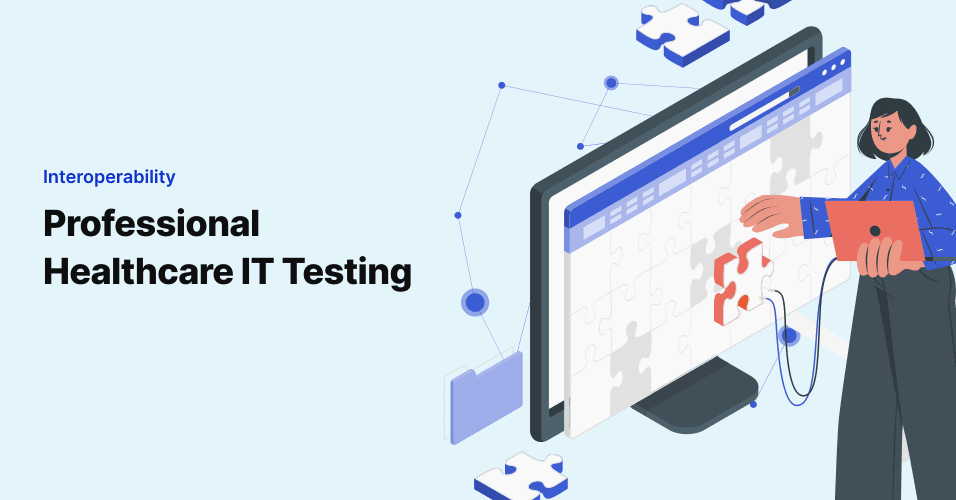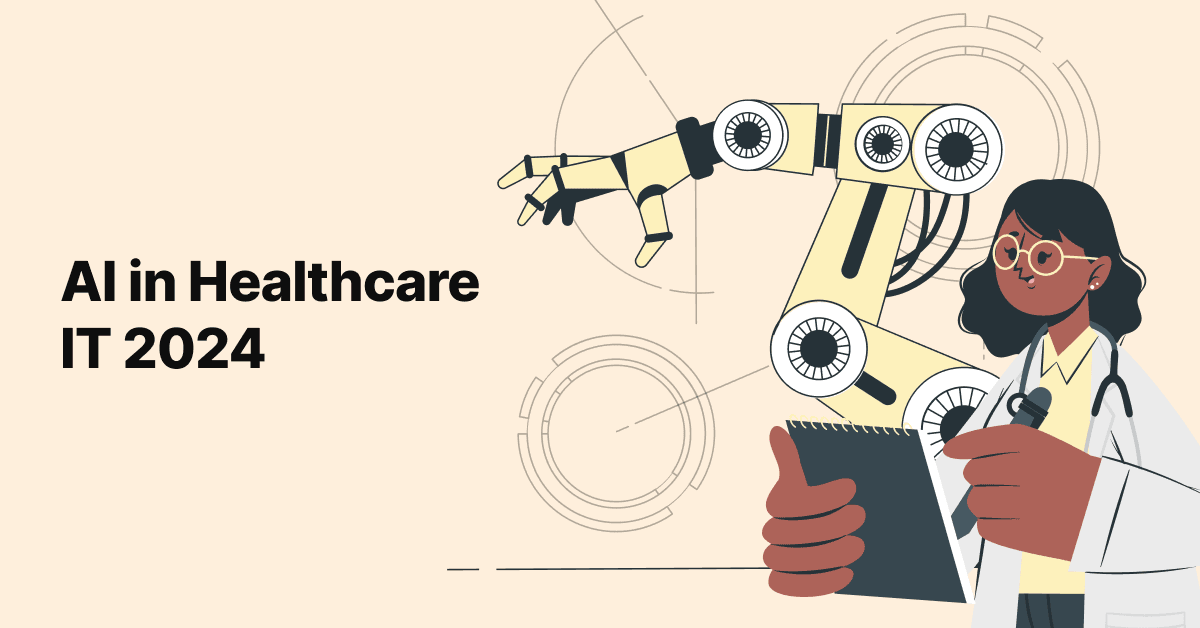
3 Reasons You Need Professional Healthcare IT Testing for Interoperability
We’ve worked with many healthcare clients over the years, and while there is no shortage of impressive and …

Artificial Intelligence (AI) in 2024 has emerged as a beacon of transformation, promising to redefine the norms of healthcare IT by 2024. With its incredible potential to enhance patient care through precise diagnostics and improve operational visibility and productivity with real-time insights, AI is not just an innovation; it's a revolution.
In this article, we'll be unpacking the transformative shift AI is bringing to Healthcare IT in 2024 and examine how it is set to revolutionize diagnostics, treatment plans, patient monitoring, and much more.
From Machine Learning (ML) and predictive analytics to Natural Language Processing (NLP) and beyond, we'll dive deep into the realms where technology meets humanity, shedding light on how AI is poised to improve outcomes for patients and practitioners alike.
Explore:
Artificial intelligence (AI) is revolutionizing the landscape of healthcare IT, driving innovation and efficiency across various facets of the industry. AI algorithms are now deeply integrated into various facets of healthcare, from diagnosis and treatment planning to administrative tasks such as patient scheduling and billing. Machine learning models have reached new heights of accuracy and reliability, enabling healthcare providers to leverage vast amounts of data to make more informed decisions and personalize treatment plans for individual patients. Additionally, Natural Language Processing (NLP) algorithms have advanced to the point where they can efficiently extract valuable insights from unstructured clinical notes, enabling faster and more accurate diagnosis.
Moreover, the adoption of AI-powered medical imaging technologies has revolutionized diagnostic practices, allowing for earlier detection of diseases and improved patient outcomes. AI algorithms trained on large datasets can detect subtle patterns and anomalies in medical images with a level of precision and speed that surpasses human capabilities. As a result, radiologists and other imaging specialists can streamline their workflows, reduce interpretation errors, and focus more on complex cases requiring their expertise.
Furthermore, AI-driven predictive analytics tools are increasingly used to forecast disease outbreaks, anticipate patient needs, and optimize resource allocation, thereby enhancing the overall efficiency and effectiveness of healthcare delivery. However, challenges such as data privacy concerns, regulatory compliance, and ensuring the ethical use of AI in healthcare continue to be areas of focus for stakeholders striving to harness the full potential of AI while safeguarding patient rights and well-being.
In 2024, the landscape of healthcare IT is witnessing an unprecedented transformation driven by remarkable advancements in AI. These breakthroughs are revolutionizing patient care, clinical decision-making, and operational efficiency across the healthcare sector.
Let's delve into the latest AI breakthroughs reshaping healthcare IT:
The integration of Artificial Intelligence (AI) into healthcare delivery has revolutionized the industry, offering a myriad of benefits that enhance both patient care and operational efficiency. Let's delve into the transformative impact AI has had on healthcare delivery:
1. Improved Accuracy and Efficiency in Diagnosis and Treatment:
AI-powered diagnostic tools have demonstrated remarkable accuracy in detecting diseases and conditions, often surpassing human capabilities. Machine learning algorithms analyze vast amounts of medical data, including imaging scans, lab results, and patient histories, to identify patterns and make predictions. This enables earlier detection of diseases, leading to prompt interventions and improved patient outcomes. Additionally, AI assists healthcare professionals in developing personalized treatment plans tailored to individual patient needs, optimizing efficacy and minimizing adverse effects.
2. Enhanced Patient Outcomes and Personalized Care:
AI empowers healthcare providers to deliver more personalized care by leveraging patient-specific data to tailor treatments and interventions. Through predictive analytics, AI algorithms can forecast potential health risks and recommend preventive measures, allowing for proactive management of chronic conditions and reducing the likelihood of complications. Moreover, AI-driven decision support systems help clinicians make informed choices by synthesizing vast amounts of medical literature and patient data in real-time, ensuring that treatment decisions align with the latest evidence-based practices.
3. Streamlined Administrative Processes and Cost Savings:
AI technologies streamline administrative tasks, such as scheduling appointments, managing electronic health records (EHRs), and processing insurance claims, thereby reducing administrative burdens and enhancing operational efficiency. Natural language processing (NLP) algorithms facilitate the extraction of pertinent information from clinical documentation, automating coding and billing processes while minimizing errors. By automating routine tasks, healthcare organizations can allocate resources more efficiently, optimize staff productivity, and reduce operational costs. Additionally, AI-driven predictive analytics assist in resource allocation and demand forecasting, enabling healthcare providers to anticipate patient needs and allocate resources accordingly, thus optimizing resource utilization and minimizing waste.
314e provides some groundbreaking AI-powered solutions designed to enhance efficiency and optimize workflows for healthcare professionals.
Some of the ways these solutions help in managing and delivering optimized patient care with the integration of AI include:
1. AI-powered Just-in-Time Training Platform for EHR Users:
Keeping pace with the dynamic demands of Electronic Health records (EHR) can be challenging. Here’s how 314e’s AI-powered Just-in-Time EHR Training Platform helps:
2. AI-powered Healthcare Document Management System:
Managing vast volumes of healthcare documents can be a daunting task. 314e’s cloud-native and HIPAA-compliant Document Management System harnesses the power of AI to streamline processes and optimize efficiency:
3. AI-powered Healthcare Data Archive:
Managing and preserving legacy EHR data can be complex and resource-intensive. Here’s how 314e’s AI-powered healthcare data archiving solution simplifies this process with its robust, AI-powered healthcare data archiving solution:
The future of AI in healthcare IT holds boundless potential and opportunities, poised to revolutionize how medical services are delivered, managed, and optimized. AI algorithms are increasingly adept at analyzing vast amounts of patient data, offering insights into disease patterns, treatment efficacy, and personalized healthcare interventions.
Machine Learning (ML) models can predict patient outcomes, enabling healthcare providers to intervene proactively and tailor treatments to individual needs. Natural Language Processing (NLP) facilitates more efficient documentation and analysis of medical records, streamlining administrative tasks and improving diagnostic accuracy.
Virtual health assistants powered by AI enhance patient engagement and provide round-the-clock support, augmenting traditional healthcare services. Moreover, AI-driven diagnostic tools promise faster and more accurate disease detection, ultimately saving lives and reducing healthcare costs.
As AI technologies continue to advance, their integration into healthcare IT holds immense promise for improving patient outcomes, enhancing operational efficiency, and transforming the delivery of healthcare services.
Join over 3,200 subscribers and keep up-to-date with the latest innovations & best practices in Healthcare IT.

We’ve worked with many healthcare clients over the years, and while there is no shortage of impressive and …

The healthcare industry is in the midst of a positive shift towards innovation and transformative …

Given the sheer complexity of managing patients across the care continuum for a community or population, it’s …